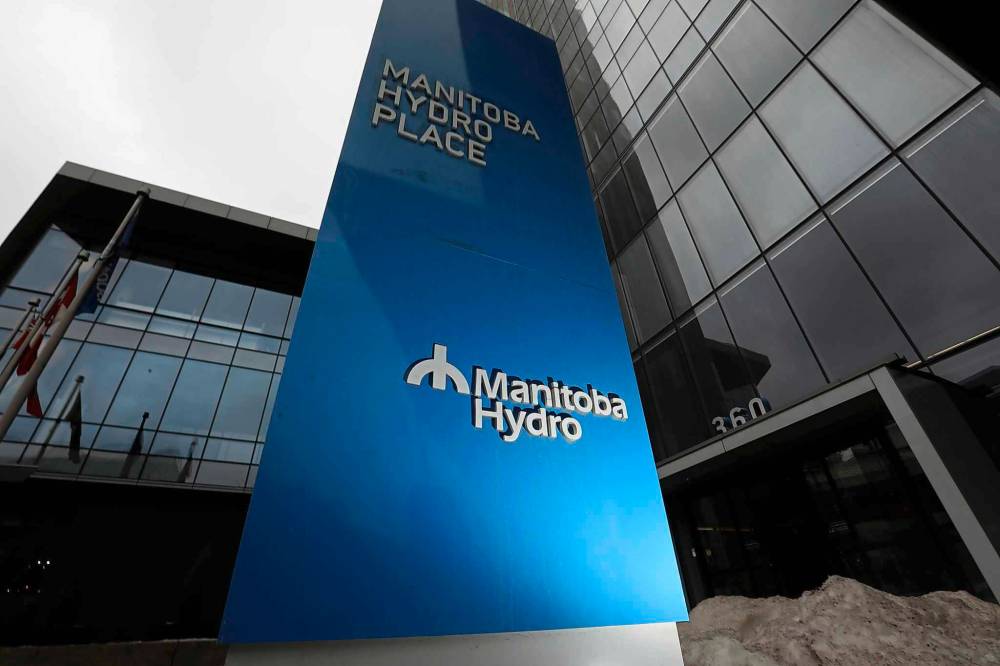Time to dial down government draw from Hydro
Read this article for free:
or
Already have an account? Log in here »
To continue reading, please subscribe:
Monthly Digital Subscription
$0 for the first 4 weeks*
- Enjoy unlimited reading on winnipegfreepress.com
- Read the E-Edition, our digital replica newspaper
- Access News Break, our award-winning app
- Play interactive puzzles
*No charge for 4 weeks then price increases to the regular rate of $19.00 plus GST every four weeks. Offer available to new and qualified returning subscribers only. Cancel any time.
Monthly Digital Subscription
$4.75/week*
- Enjoy unlimited reading on winnipegfreepress.com
- Read the E-Edition, our digital replica newspaper
- Access News Break, our award-winning app
- Play interactive puzzles
*Billed as $19 plus GST every four weeks. Cancel any time.
To continue reading, please subscribe:
Add Free Press access to your Brandon Sun subscription for only an additional
$1 for the first 4 weeks*
*Your next subscription payment will increase by $1.00 and you will be charged $16.99 plus GST for four weeks. After four weeks, your payment will increase to $23.99 plus GST every four weeks.
Read unlimited articles for free today:
or
Already have an account? Log in here »
Hey there, time traveller!
This article was published 08/02/2022 (1403 days ago), so information in it may no longer be current.
There is one thing the provincial government could do to prevent Manitoba Hydro from seeking another sharp increase in electricity rates this year: stop siphoning hundreds of millions of dollars from the Crown corporation.
It’s not a new suggestion; provincial governments of all political stripes have been criticized for using Hydro revenues to fund things such as health care and education. Those should be financed through taxation revenues, not people’s power bills.
With the Crown corporation expected to post a loss of $190-million in 2021-22 (attributed mainly due to last year’s drought), that debate is back on the table. Manitoba’s utility regulator is urging the provincial government to rethink how much it takes from Hydro every year.

“Electricity ratepayers are disadvantaged when Manitoba Hydro is required during a drought to make substantial payments to government for the benefit of taxpayers,” the Public Utilities Board wrote in its report released last month on Hydro’s latest interim rate increase application.
Manitoba Hydro transfers more of its revenue to the provincial government than any other publicly-owned electrical utility in Canada, except Hydro Quebec.
The local Crown corporation now hands over almost 20 per cent of its gross revenues to government; up from 13 per cent in 2006.
Hydro paid out $459 million to the provincial government in 2020-21, the highest amount in the Crown corporation’s history; up 45 per cent from $316 million in 2016.
Hydro paid out $459 million to the provincial government in 2020-21, the highest amount in the Crown corporation’s history; up 45 per cent from $316 million in 2016.
The biggest chunk of is the $218-million “debt guarantee fee” the province charges Hydro — a one per cent levy on the Crown corporation’s total debt.
It doesn’t cost the province anything to guarantee Hydro’s debt. It charges the fee simply as a way of diverting Hydro revenues into government coffers. The amount has tripled over the past 10 years as Hydro’s debt has increased threefold.
The province also charges Hydro a water rental fee based on how much flows through its turbines ($117 million in 2021), a capital tax only Crown corporations and financial institutions pay ($112 million), and a payroll tax of $12 million.
Manitoba isn’t the only province that uses its government-owned electrical utility as a piggy bank.

The Quebec government takes 23 per cent of Hydro Quebec’s revenues, including a hefty $1.7-billion dividend in 2020. Others, though — including British Columbia, Saskatchewan, New Brunswick and Newfoundland — take far less from their publicly-owned power companies (well below 10 per cent).
What irks the PUB is the payouts are not tied to Hydro’s revenue.
Because most of the charges are based on factors such as debt and capital, Hydro makes hefty payments to the province even when it’s losing money. The PUB says the province should at least change the payment structure to reflect the Crown corporation’s ability to pay.
“Other utilities in Canada make payments to their respective provincial governments based on the profitability of the utility in a given year,” the PUB wrote. “Manitoba Hydro’s payments to government are not related to Manitoba Hydro’s profitability or financial performance.”
The Manitoba government has been siphoning money out of Hydro for decades. It’s not a new thing.
The Manitoba government has been siphoning money out of Hydro for decades. It’s not a new thing.
One of the first things then-NDP premier Gary Doer did when he won government in 1999 is double the debt guarantee fee and the water rental charge. He also further raided the Crown corporation in 2003-04 by taking a one-time, $204-million “dividend.”
The Tories criticized the move at the time, while in opposition, but they didn’t change it once they got back into government.

It’s unclear how much Hydro expects to raise rates later this year when it files its next general rate application.
Whatever it is, the PUB’s recommendation the province reduce how much it takes from Hydro would help mitigate rate shock. It would assist both residential customers and businesses that have expressed concern in recent years about Hydro’s lack of long-term planning on rates.
With electricity rates in Manitoba already up 3.6 per cent this year, there would be no better time than now for the provincial government to stop using Hydro as its ATM machine.
tom.brodbeck@freepress.mb.ca

Tom has been covering Manitoba politics since the early 1990s and joined the Winnipeg Free Press news team in 2019.
Our newsroom depends on a growing audience of readers to power our journalism. If you are not a paid reader, please consider becoming a subscriber.
Our newsroom depends on its audience of readers to power our journalism. Thank you for your support.





